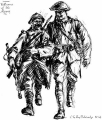 the Archive of World War 1 Photographs and Texts
the Archive of World War 1 Photographs and Texts

Aftermath of World War 1
The United States
The United States entered the War late and suffered the least of all the combatants. The mainland of the United States was never attacked and its military casualties were comparatively light.American involvement in the war played a decisive role in defeating Germany. In doing so, the United States became a super power militarily.
The War also brought many changes at home. Women began working in munitions factories and for the first time a significant number of women were earning substantial salaries. This contributed to the growth of the Women's Suffrage movement and laid the foundations for the dizzying social changes that took place in the 1920s.
Though the United States emerged relatively unharmed by the war, the American electrorate was for the most part disillusioned with the war and its aftermath. As a result, the United States adopted an isolationist policy in the post war years, which would mean that the United States would be slow to intervene in World War 2.
France
Almost all of the fighting on the Western Front took place on French soil. No country suffered more casualties or more devastation to its cities and infrastructure than France. Millions of its young men were killed or wounded.
As one of the victorious allies, France gained the region Alsace-Lorraine, which Germany had annexed from France during the war of 1870. It also demanded and obtained the right to war reparations from Germany. Germany was required to pay vast amounts of money to France as compensation for its losses suffered during the war.
However Germany could not make the payments because its own economy had been devastated by the war and economic sanctions that followed. This led to continued hostility between Germany and France. The Germans resented the heavy burden imposed on them by the reparation payments; and when Germany could not pay, it led to military adventures on the part of France to collect what was owed to it. In 1923 France occupied the Ruhr, Germanys industrial heartland, in order to force Germany to pay.
The issue of war reparations would be an unhealed wound between the two nations and contribute to the resurgence of German militarism in the 1930s.
The League of Nations
The League of Nations was a predecessor of the United Nations. Like the United Nations, the League was meant to provide a forum for the countries of the world to resolve their differences through peaceful debate and democratic vote. It was headquatered in Switzerland.
Although the League founded on the ideas of American President Woodrow Wilson, who first proposed it, the United States never joined the League because of isolationist views among the American public and lawmakers.
The failure of the United States to joing th e league of Nations weakened its effectiveness. In the long run the League proved ineffective to stop German and Italian aggression. It dissolved at the end of World War 1 and was replaced by the United Nations, which inherited many of its institutions.